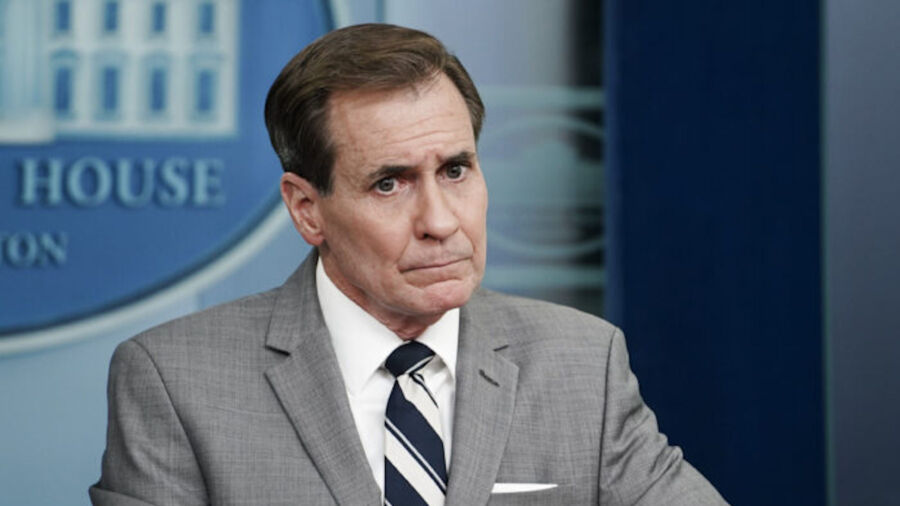White House National Security Council spokesperson John Kirby said on Wednesday that a second American citizen has died in Sudan amid an ongoing violent conflict between the army and a paramilitary group.
Kirby, speaking to reporters via video call, did not provide further details on the circumstances of the unidentified American’s death, but he did confirm that the U.S. national died on Tuesday.
“We extend our deepest condolences to the family,” Kirby said, Fox News reported. “We continue to make clear at the highest levels of our government the leadership of both the Sudanese Armed Forces and the Rapid Support Forces that they are responsible for ensuring the protection of civilians and noncombatants, including people from third countries and humanitarian staff that are working to save lives.”
Kirby also noted that the fighting appears to have subsided “significantly” and the Biden administration was continuing to work with both sides of the conflict to strengthen the ceasefire in order to allow more humanitarian assistance.
“Although there are some reports of violence and sporadic shelling and firing, we’re glad to see that the levels of violence generally appear to have gone significantly down,” Kirby said. “We urge both military factions to fully uphold the ceasefire and to further extend it.”
“We’ve said this many, many times that the violence is simply unconscionable and it must stop,” he added. “We’ve got to do what’s right for the Sudanese people. They want a return to peace and security in Khartoum and around the country, and they want to see a transition to civilian authority. And we need to keep working at that.”
Last week, a State Department spokesperson confirmed the death of the first American citizen in Sudan in a statement to media outlets.
The White House’s comments come after a 72-hour cease-fire between the Sudanese Armed Forces (SAF) and Rapid Support Forces (RSF) was announced on Monday following “intense negotiations over the past 48 hours,” Secretary of State Antony Blinken said in a statement earlier this week.
Despite the truce, a witness reportedly heard sporadic gunfire and explosions in the city of Omdurman, though locals said fighting was limited to the SAF headquarters in Khartoum and around bases in Omdurman.
The latest ceasefire is the fourth effort to stop the fighting since the Sudan conflict started on April 15. Several short-lived ceasefires had been agreed upon between the two warring groups over the past week, but they have all failed to hold.
Evacuation
The Biden administration, meanwhile, has come under fire from some Americans back home over the president’s evacuation response, with one critic comparing it to “Operation Eagle Claw”—a U.S. military operation ordered by President Jimmy Carter to attempt the rescue of 52 embassy staff held captive in Iran.
Joe Kent, a retired U.S. Army Special Forces veteran, said in a tweet that he believes it’s a “disgrace” for President Joe Biden to leave Americans behind.
Kent said that more than four decades ago, the U.S. government “refused to leave Americans behind in Iran [and] took great risks [and] suffered a tragic loss trying to rescue our people,” referring to Operation Eagle Claw.
“Today, Biden tells 16,000 Americans trapped in Sudan they are on their own,” he added. “Leaders don’t abandon their people. Biden is a disgrace.”
Last week, Biden ordered the U.S. military to evacuate government personnel from Khartoum, which totaled fewer than 100 people. However, reports emerged that the State Department indicated that due to the violence, the government might not help to evacuate the remaining dual-nationals in the country.
In a statement earlier this week, Blinken said only “some dozens” of Americans have expressed an interest in leaving. He added that the U.S. government does not know the specific number of Americans who remain in Sudan and only knows of those who have registered for help or expressed an interest to leave.
“Americans are not required to register with the embassy, with the government, either when they go, when they reside, or when they leave. So we don’t have a good fix on the number of Americans who are there at any given time, including now,” Blinken said.
‘Actively’ Helping Americans
Kirby said on Wednesday that Biden has “asked for every conceivable option to help as many Americans as possible,” and that it was “actively facilitating the departure of a relatively small number of Americans” who wished to leave.
Some Americans had arrived at Port Sudan to evacuate and were being supported, and the United States was continuing to support other limited evacuation efforts, he added.
The U.S. Agency for International Development (USAID) has deployed teams in the region and is prepared to help provide humanitarian assistance, but any ceasefire would have to remain in place and be extended, Kirby said.
The World Health Organization (WHO), meanwhile, said more than 450 people have been killed in the fighting and at least 4,000 wounded. The conflict has also destroyed hospitals, limited food distribution, and cut power supplies in a nation already reliant on aid for an estimated third of its population—or about 16 million people, according to U.N. figures.
In addition, Dr. Nima Saeed Abid, the WHO’s representative in Sudan, told a United Nations briefing in Geneva via video link from Port Sudan on Tuesday that the central public health laboratory in Khartoum—which stores disease pathogens for polio, among others—has been seized by armed forces and technicians are unable to secure the hazardous materials after being removed from the building.
“That is extremely, extremely dangerous because we have polio isolates in the lab. We have measles isolates in the lab. We have cholera isolates in the lab,” Abid said. “There is a huge biological risk associated with the occupation of the central public health lab in Khartoum by one of the fighting parties.”
Reuters contributed to this report.

